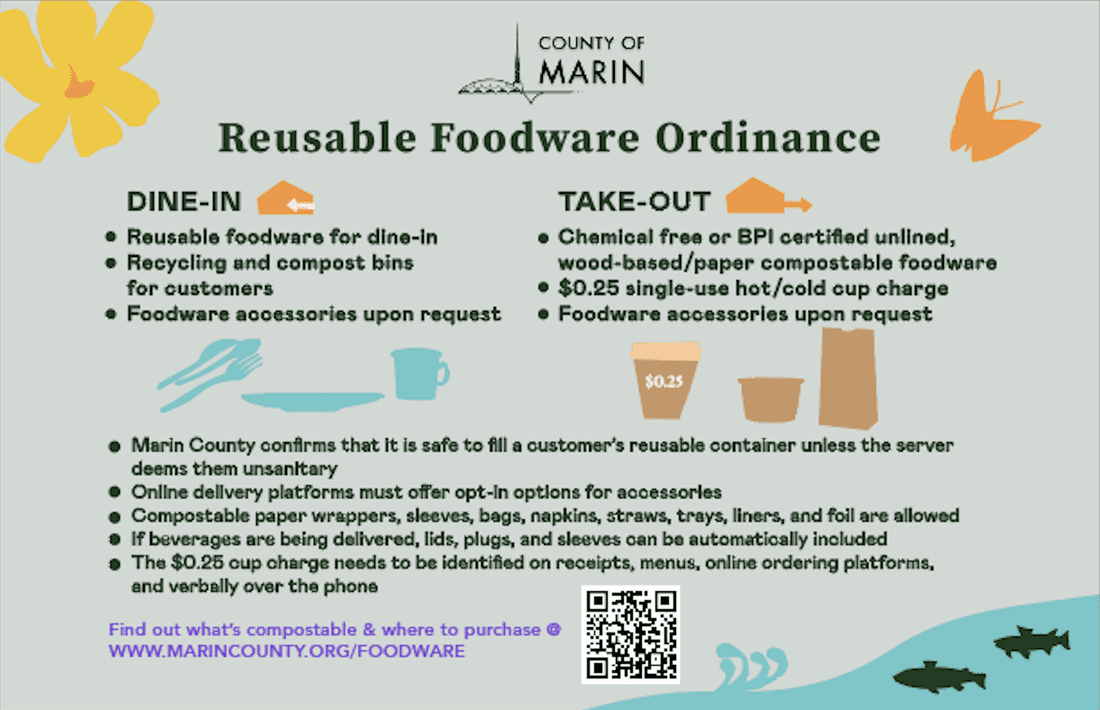 An effort three years in the making that was delayed by the COVID-19 crisis – passing a countywide Reusable Foodware Ordinance that seeks to combat climate change via a ban on the use of single-use plastic foodware – took another step towards becoming reality this week when the Mill Valley City Council unanimously backed the first reading of an ordinance to do so.
An effort three years in the making that was delayed by the COVID-19 crisis – passing a countywide Reusable Foodware Ordinance that seeks to combat climate change via a ban on the use of single-use plastic foodware – took another step towards becoming reality this week when the Mill Valley City Council unanimously backed the first reading of an ordinance to do so.
The ordinance, whose key details are listed in the graphic above, seeks to move food-serving businesses away from single-use products and deploy more recycling and compost bins for customers, for instance.
The new law would require grocery store food counters, restaurants, delis, bakeries, farmers markets, food trucks, carry-out vendors and other food service providers to use natural-fiber compostable foodware. Banned materials include disposable forks, spoons, knives, chopsticks, napkins, cup sleeves, food wrappers, beverage trays, condiment containers, toothpicks and straws. Food-serving businesses could only make those materials available “upon request” or at a self-serve takeout station. Plastic straws could be made available on request, but only to accommodate people with “access needs,” per the ordinance.
The ordinance is set to take effect on Nov. 10, 2023, though county and city officials have indicated that if additional funding is needed to support businesses making the transition, city officials could lean on the Zero Waste JPA, which would provide “anywhere from $10,000-$20,000,” City Manager Todd Cusimano said. “If this is not working in November we are going to pivot – we need to be working collaboratively with out businesses.”
“We still have consultants on board to help us out – this will continue for a little while,” said Gregory Pirie, the county’s deputy director of Environmental Health Services. “We don’t want to be in an enforcement stage on November 10.”
One of the ordinance’s elements that has gotten much of the attention has been on coffee cups. Customers can bring their own reusable cups, but if they don’t, they will be charged an extra 25 cents to do so, with the food-serving business receiving that additional revenue. That means that, as of Nov. 10, 2023, Starbucks, Peets, Equator and other coffee shops in Marin would be required to pass along the 25-cent charge.
“Most of our businesses are already in compliance with most of the ordinance,” said Councilmember Max Perrey said, who spearheaded some of the outreach to businesses. “We should go to the county and tell them, ‘here are the successes and we need additional funding,’ or we can top it up with Zero Waste funds, which exist at the city level to fund these sorts of projects.”
“A benefit to adopting this ordinance is that businesses will have clear rules of the road across geographic jurisdictions,” Perrey said. “We’re not just doing this in Mill Valley. There will be continuity across businesses throughout the county.”
“This is a really important first step,” newly elected Councilmember Caroline Joachim said. “I do believe that our residents and businesses want to do the right thing, but they are often confused about what cup goes into what bin. We’re going to need ongoing education, with grants for those in need.”
“In Mill Valley, we’re often proud to be a pioneer,” Councilmember Stephen Burke said. “But sometimes it’s good to be a fast follower. In this instance, we can learn from the county and adjacent municipalities and see where we can close the loop so that there are no outliers in Marin.”
Councilmember Urban Carmel, who has family in the Midwest and the South, sought to put the issue within a national context. “You have to appreciate where we are,” he said. “You are the tip of the spear. The rest of the country is doing virtually zero on this stuff. Change like this starts in California and places like Marin County and Mill Valley. What we’re doing right now is really important for what the rest of the country is going to do. I love this ordinance. It’s really not about penalties.”
While the County of Marin passed the ordinance for all of unincorporated Marin in May 2022, jurisdictions throughout the county are at various stages of the process towards passage. Tiburon adopted in August 2022. Mill Valley and San Anselmo have both completed their first readings and are expected to give final passage in May. Fairfax has completed its first reading. Corte Madera is working through the process, Larkspur held a hearing late February. Belvedere, Ross and San Rafael are still working through the process, while Novato backed the ordinance this month for later this month, according to county updates and the Marin Independent Journal. Sausalito has drafted single-use plastics code language.
The work by individual jurisdictions to pass the ordinance comes amidst the ongoing debate around bioplastic products, which are made using renewable sources such as corn and sugarcane instead of petroleum and are more widely available and less costly. But while executives at company’s like Amy’s Kitchen have urged county officials to convince WM Earthcare, the owner of the Redwood Landfill where Marin’s refuse goes, step back from its business decision to accept 100% certifiable compost as well as bioplastics and process them via dual streams, all efforts appear pointed away from the possible inclusion of bioplastics.
Here is the link to the Marin County Product Purchasing Guide.


